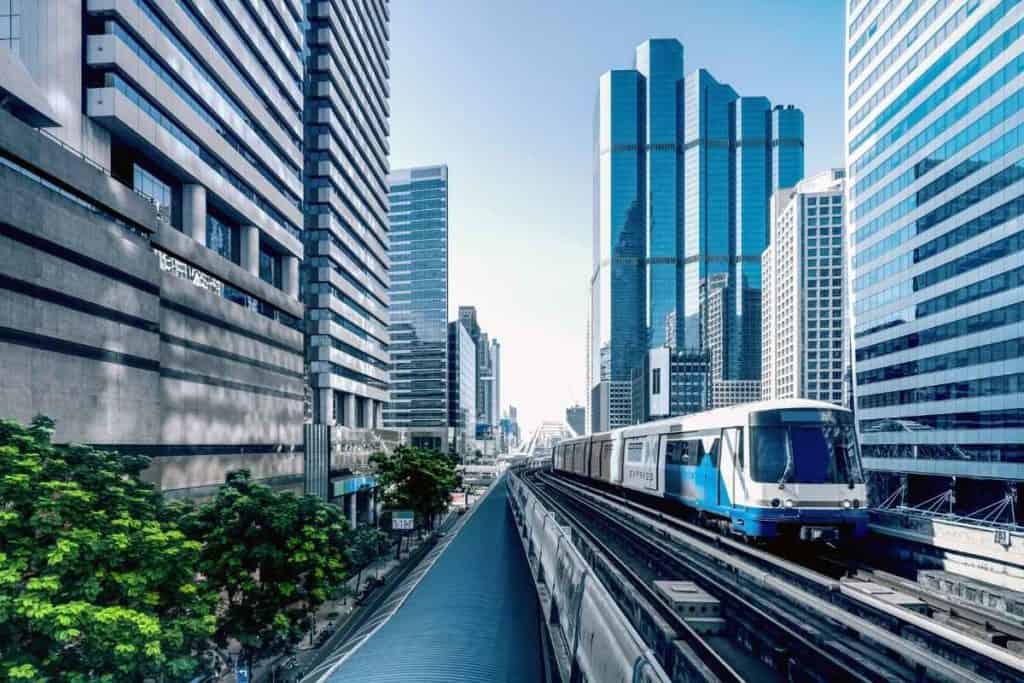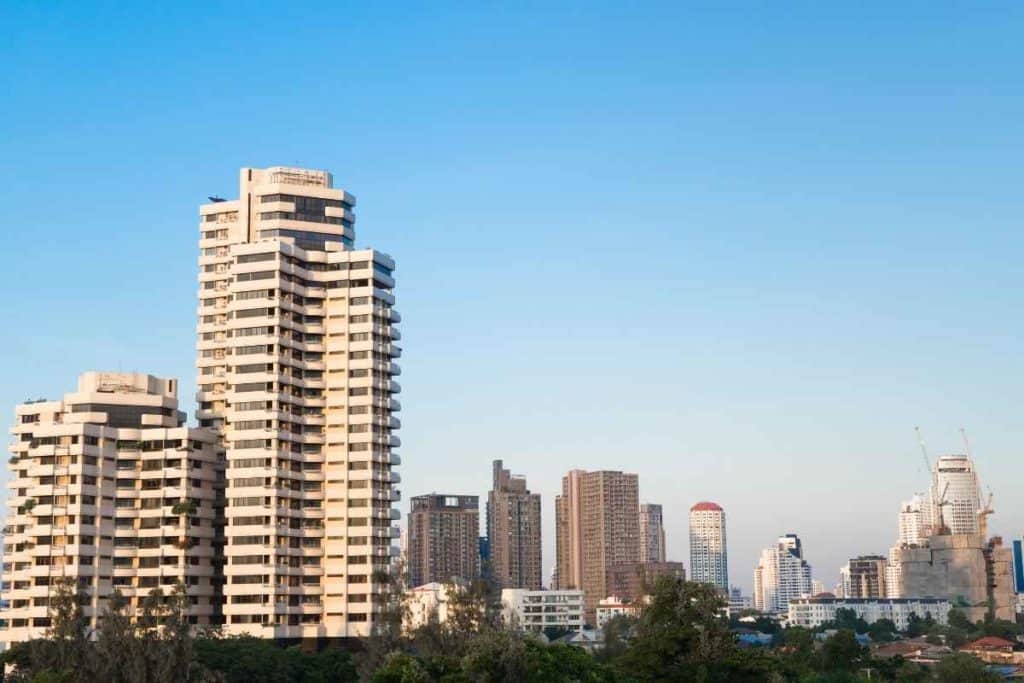Thailand offers unique attributes for travelers and expats; beach towns, cultural centers, busy cities, and secret hideaways are provided amongst an ongoing increasing population (1). While expenses vary on accommodation, food, taxes, and visa fees, you can find the same requirements for any country in the world. Now before you book that one-way ticket to The Land of Smiles, how much is rent in Thailand?
You can rent an apartment in Thailand for as low as $650 in the city’s center to a luxury Airbnb for $3500 per month. While choosing to live luxury, steady, or cheap, Thailand provides accommodation for various lifestyles, noting a preference for healthcare, facilities, and way of life.
Since 2018, the exchange rate in Thailand has been steady; 30 to 33 Thai baht is equal to 1 U.S. Dollar. While using the dollar as a comparison chart, foreigners can compare costs to their respected home countries (1). Facebook marketplaces and commercial centers offer easy access for apartment searching but can be rather tricky with the language problem (1).
Rental Prices in Thailand

Bangkok is relatively expensive compared to Thailand’s counterparts. Luxury Airbnbs in the city cost around $3500 per month in Silom, Phrom Phong, Lumpini, and Sukhumvit areas, which make up Thailand’s financial and retail center (1). There are penthouses that offer swimming pools and panoramic views of the skyline (1). However, you can also opt for an average one-bedroom apartment in the city for around $650 (or at a maximum of $700) for apartment facilities, such as the gymnasium (2). With an average one-bedroom apartment outside the city center, you can pay as low as $290 (1).
Transportation Proximity:

One of the most important attributes when it comes to rentals is transportation convenience. Backpackers usually end up paying $10 to $15 per night at hotels that are nearest to the Metro (MRT) or Skytrain (BTS). The closer the rental is to transportation, the higher the price (1).
As public transport continues to expand in the suburbs, low rental prices from the south come with easy access to the city (1). One such example is a furnished studio of a luxurious condominium next to the BTS station in the suburbs; it costs $460 per month and can be negotiated even lower Furthermore, the rental comes with needed facilities with the complex, including a restaurant, gym, mini-store, infinity pool, and workplace (1). Since everything is easily accessible within the building premises, there is not much need to travel (1).
Most opt for expensive apartments near transportation services as they are cheap and convenient compared to owning a car or traveling by taxi (1). An average cost of a basic scooter rental is around $60 per month, with additional rental fees of gas at $3.36 per gallon (1). If scooters are not available, you can also opt for affordable transportation services such as red truck taxis called “songthaews” in Chiang Mai or the metro system in Bangkok. Songthaew costs as low as $1 per person, and BTS fares range from $0.50 to $1.70 (1). Living in the city also comes with the added advantage of nearby shopping malls and walkable destinations.
How Much Is Rent in Thailand?

If you prefer to rent a house, you can venture outside the city. Nonthaburi and Samut Prakan are independent cities outside of Bangkok that offer single-family housing at low costs of $200 per month (1). Beach towns near Bangkok, such as Pattaya and Rayong, also offer high-rise condominiums. Once known as fishing towns, aggressive growth in real estate investors and tourism has allowed Pattaya to rank 15th place in the 2019 Global Destination Cities Index (1).
Despite such popularity, the cost of living in Pattaya is very low; nightlife has drawn one-bedroom apartments by the beach for as low as $500 per month. The further down the island, the lower the prices become (1). Rayong is even cheaper than Pattaya, offering furnished studios for $200 (1).
Chiang Mai is another destination located in Northern Thailand, bordering Burma and Laos. Known as the digital nomad capital of the world, it is a hotspot for backpackers and foreigners. It is popular mainly for its low cost of living (1). Alongside providing beautiful temples, nightclubs, and cafes, the average rent in Chiang Mai is around $430 in the city and $300 outside the city (1).
A less well-known location is the neighboring town of Chiang Rai, which is cheaper than Chiang Mai. The average rent in the city is around $240, and half the price for rentals outside the city center. Another interesting factor is the reduction of rental fees in the “burning season” when farmers burn their crops and pollution levels rise in Northern Thailand (1).
On the stunning beaches of Phuket and Krabi, luxurious resorts have replaced cheap bungalows. One-bedroom apartments are rather pricey at $470 in Krabi but cheaper in Koh Lanta, with Airbnbs for $230 (1). Rentals are usually priced depending on the radius of proximity to the beach, with beachfront villas costing around $2000 per month. Cities such as Songkhla are less known popular towns and barely have resorts; in this case, apartments can be found for as little as $100 (1).
Another dream destination is the Gulf of Thailand, home to Koh Samui, Koh Pha Ngan, and Koh Tao, islands that offer various apartments and activities for tourists (1). Koh Samui is the largest island of all three and offers average one-bedroom apartments for $270 to $390 per month. Koh Pha Ngan, known for full moon parties, offers high-end and furnished apartments for as low as $1000, with upward payments for air conditioning and facilities (1). Lastly is Koh Tao, a small island for backpackers on a budget; Airbnbs cost as low as $150 per month.
Generally, the further you move away from tourist destinations, the cheaper the rental costs will be. Rural areas even offer apartments for as low as $50 per month (1).
Thailand is Known as the Retirement Destination

Thailand is well known for being a retirement destination; living costs are low, you can stretch your retirement savings, and the country is rich in warm weather, culture, delicious cuisine, and friendly people (2). Home to active retirees, living costs are 30% to 40% cheaper than in the United States (2).
Numbeo also recorded that the average cost of living in Thailand is 34% lower than living in the U.S., and rents are 63% lower on average (2). When living on a budget of $1500 per month or $5000 for luxury residents, many foreigners can get a retirement visa and spend the rest of their work-free life in Thailand (2).
While having to be 50 years old, not having a criminal record, and having a Thai bank account with as low as 800,000 Thai baht in savings, this can be a rather difficult option. Going through immigration every 90 days might not be the ideal situation for someone hoping to rest. Even then, Thailand remains a popular retirement destination for its locally reduced costs from food to entertainment and facilities (2).
Housing:

If you compare the rent of living inside the city, you can live under half that amount outside the city (2). When compared to New York, an apartment within the city costs $3100 per month, which is five times the price of an apartment in Bangkok. Consumer prices in the Big Apple are also 91% higher (2). Most retirees from the States go to Sarasota or Florida, where consumer prices are also 53% higher than in Bangkok. Sarasota apartments cost around $1600 per month, 2.5 times the rent in Bangkok city (2).
However, even with reduced costs, there are other factors that matter. When thinking of housing, utilities are an essential factor. If you are renting an unfurnished apartment, you have the responsibility of buying furniture. Additionally, you have to pay for electricity, phone bills, water, air conditioning, and the meter (1). Fortunately, Numbeo reported average utility bills of around $68 per month, including electricity, heating, cooling, water, and garbage (1), which is not as pricey as expected.
Food:

You can not consider rent without thinking about food. Delicious yet cheap, Thai food can be affordable for most. This does come with the budget of reducing western and international brands or eating out at expensive luxury restaurants every other day. Food costs can vary by location, with islands and resort areas offering goods for higher prices while small family-friendly neighborhoods can provide tasty dishes for as low as $2.
Thailand is home to street vendors selling fresh fruit and shakes from $0.50 to $1, making it an easy alternative to expensive supermarket goods. That said, not all food in Thailand is cheap. Western ingredients can leave you spending $15 for an imported bag of chips, which is why it is important to be mindful when it comes to reducing your food budget.
Healthcare:

Healthcare is another essential component when it comes to adding money to the rent you know you can afford. Thailand does not offer public health insurance, which means you need to get private insurance. Even then, the average cost of healthcare in Thailand is lower than in the United States, in caution that you do not require extra medical attention or everyday care (2). The best insurance comes from travelers home country, which is something to keep in mind
With cheap healthcare, a procedure that costs $25,000 in America can cost only $1500 in Bangkok (1). The main issue is that you will not always find English-speaking staff, besides when you’re in main tourist hubs. Be mindful that when considering the rent of your apartment, you can always go to local hospitals, as it is not 100% efficient to say that you will only find the best doctors at the most expensive location.
Most expats in Thailand rely on travel insurance or international health insurance, ranging from $40 per month to comprehensive plans that cost a few hundred dollars per month (1).
Taxes:

Another component added to rent is taxes. Once you have lived in Thailand for around 180 days/ six months, you need to start paying income taxes, regardless of whether you have a work visa or not (2). This includes domestic and international income (2). Just because you live abroad does not mean you can enjoy all facilities free of cost.
Thailand has an income tax bracket similar to the United States, ranging from 0% to 35% (1). Americans can file taxes in the U.S. to avoid double taxation (1).
Conclusion
In addition to everyday expenses, rent comes with grocery shopping, entertainment, food, and taxes. While working to make an intercontinental move, it is important to consider all options before making a life-changing decision (1).
Not only do you need to pay to travel and ship all your belongings across the globe, but you need to look into the varying prices of rent in different regions of Thailand and components that are or are not offered. Transportation, convenient shopping, and commuting to work are important aspects to consider.
Thailand is not the cheapest place in the world to live. However, it can be inexpensive if you make it that way; cheap apartments and way of life can be a considerate option. However, if you make a good amount, Thailand is an excellent place to invest in a luxurious apartment that fits all your needs. From facilities to skyline or mountainous views, you will never be left unsatisfied.
Like always, if you want to discover more about Thailand, stay guided with ThaiGuider. You might learn something you never knew about this unique country.
References
1. Glass, Mitch. Cost Of Living In Thailand – How Much For Rent, Food & Entertainment. Money Crashers. [Online] July 19, 2021. https://www.moneycrashers.com/cost-of-living-thailand/.
2. Silva, Derek. How To Retire Tn Thailand. SmartAsset. [Online] March 24, 2021. https://smartasset.com/retirement/how-to-retire-in-thailand/.
THINKING ABOUT A TRIP TO THAILAND?
I am working on a FREE Thailand Travel Guide with a FULL 7 Day Itinerary. Be the first to receive it!
Thank you for signing up.
Something went wrong.
